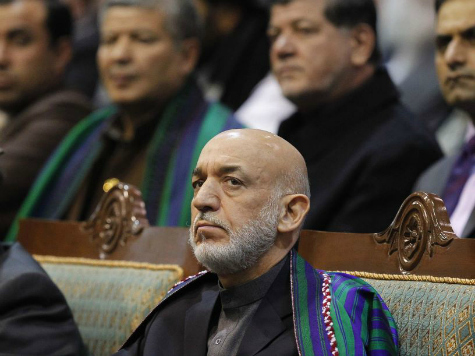The U.S. will pursue complete U.S. military withdrawal from Afghanistan at the end of 2014, also known as the “zero option,” unless the Afghan president signs the bilateral security agreement (BSA) between Kabul and Washington in the upcoming “weeks… not months,” the White House warned on Monday.
When talking to reporters on Monday, White House Press Secretary Jay Carney emphasized a sense of urgency for Afghanistan President Hamid Karzai to sign the agreement if the U.S. is to leave a residual military force beyond the end of this year when the U.S./NATO-led combat mission is expected to end.
The agreement will allow the U.S. to plan the size, scope, and timeline of the U.S. military presence in Afghanistan post-2014.
That “small, contingent” force, as described by Carney, is expected to continue training the Afghan forces and assisting them in conducting counterterrorism operations.
“Our position continues to be that if we cannot conclude a bilateral security agreement promptly, then we will be forced to initiate planning for a post-2014 future in which there would be no U.S. nor NATO troop presence in Afghanistan,” said the White House spokesman. “That’s not the future we’re seeking. That’s not the policy the President believes is best and we don’t believe it’s in Afghanistan’s interest. But the further this slips into 2014, the more likely that outcome will come to pass.”
“The President, when it comes to Afghanistan, has made clear that he believes we should and can have a continuing mission there focused solely on training Afghan troops and counterterrorism. But being able to do that and fulfill that requires the Afghan government to sign the bilateral security agreement and they have not done so,” Carney also told reporters. “And as each day passes, it becomes harder to plan with our NATO allies for a post-2014 mission, because we can’t do that without a BSA that’s signed after it’s been negotiated. And as you know, there were commitments by the Afghan government to complete that by the end of the year.”
When asked how much time Afghanistan has to make a decision on the agreement, Carney responded, “I can tell you that we’re talking about weeks and not months.”
A bilateral security deal had already been reached, but Karzai threw the process into confusion by introducing new terms and conditions, the Congressional Research Service (CRS) noted in a report released last month.
“President Karzai, in a sustained combative tone, introduced new conditions that the U.S. government has rejected,” reported CRS. “Those conditions reportedly included limitations on the participation of U.S. forces in raids on homes, and the release of Afghan prisoners from the Guantanamo Bay detention facility, as well as the postponement of signing the BSA until after the conclusion of Afghan presidential elections scheduled to be held in spring 2014.”
U.S. officials have refused to negotiate.
In a joint statement released Jan. 4, Republican Sens. John McCain of Arizona and Lindsey Graham of South Carolina, both members of the Senate Committee on Armed Services, warned against the “zero option.”
“Talk of a ‘zero option’ must be dismissed as the surest way to squander all of our hard-won gains, thereby allowing Afghanistan to re-emerge as a safe haven for Al-Qaeda and its terrorist allies,” stated the senators. “President Obama finally needs to decide on the missions and troop levels necessary to secure U.S. national security interests and support our Afghan partners beyond 2014. And he needs to move quickly to finalize the Bilateral Security Agreement with the Government of Afghanistan.”

COMMENTS
Please let us know if you're having issues with commenting.